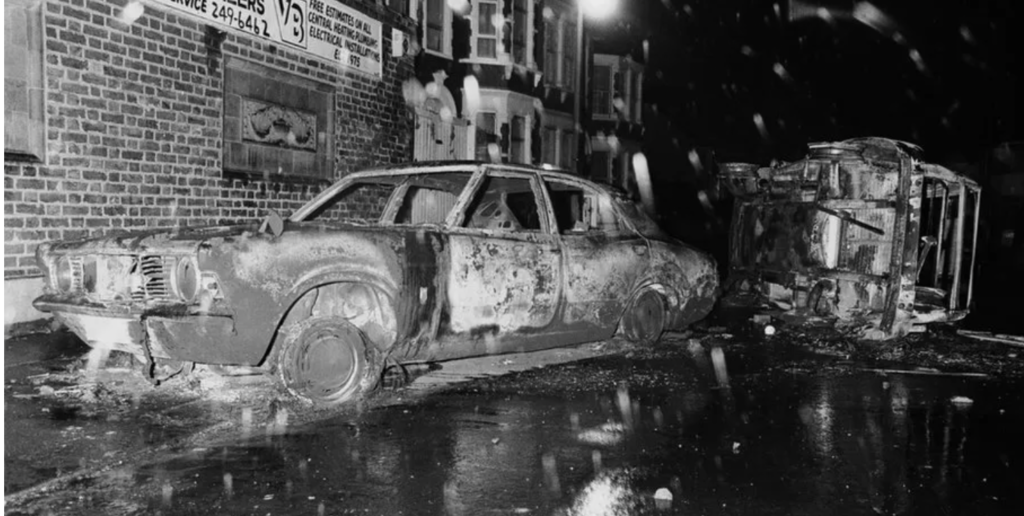Plans to redevelop a Tottenham estate can move forward after Haringey Council’s proposals were backed by residents.
The planned regeneration of the Broadwater Farm Estate won the support of 85 per cent of residents who voted on the scheme, although only 55 per cent of those who were eligible to vote took part in the ballot.
The scheme will provide 294 new council homes; 242 to replace homes set to be knocked down and an extra 52 to help meet the local demand for social housing.
The council drew up plans to regenerate the estate, which was built in the 1960s and 70s, after structural faults were found in the Tangmere and Northolt blocks, putting them at risk of collapse. Strengthening the unsafe buildings was deemed “extremely costly”.
Under the plans, the two unsafe blocks will be demolished, along with the Stapleford North block, the enterprise centre and the medical centre. The redevelopment will see blocks ranging from three to nine storeys high built on the site, providing new homes, a modern health and wellbeing centre and affordable workspaces.
Ruth Gordon, Labour cabinet member for house building, placemaking and development, said: “It’s fantastic to see residents vote yes and overwhelmingly back our plans for the delivery of high-quality, safe and genuinely affordable accommodation.
“I am proud of the schemes we are undertaking to deliver a new generation of council homes, and I’m delighted residents agree the Broadwater Farm plan is a worthy addition.”
Cllr Gordon described the proposals as “resident-led” and pledged to continue working with residents to ensure they “benefit most from the opportunities the redevelopment will bring”.
The vote took place because Greater London Authority rules state that regeneration projects involving the demolition of homes must have the backing of a majority of residents before they can receive funding from City Hall.
Residents currently living on the estate and those who were rehoused from Tangmere and Northolt blocks were able to vote on the proposals. The council says all Tangmere and Northolt tenants will be able to return to a new home once they are built, with priority for the remaining homes given to residents on the estate.
The riots
The estate was the location the 1985 riots, 30 years ago PC Keith Blakelock was stabbed in the Broadwater Farm riots in Tottenham, north London. Despite numerous investigations no-one has ever been convicted of his murder.
On 5 October 1985 four policemen burst into the home of Broadwater Farm resident Cynthia Jarrett looking for stolen property.
They failed to find any, but Ms Jarrett had a heart attack and died.

Her death was only weeks after riots in Brixton, south London, which happened following the accidental shooting of Cherry Groce by police officers.
On 6 October, following Ms Jarrett’s death, her family met with police and demanded an inquiry. They made it clear though that they did not want any kind of public disorder.
In the hours that followed, up to 500 officers were drafted in, battling with rioters throwing bottles and cans from the walkways within the estate.

At about 22:15 BST, PC Keith Blakelock was repeatedly stabbed and, a court later heard, attempts were made to decapitate him.
PC Blakelock, who was from Sunderland, was trying to protect firefighters tackling a blaze. He died later in hospital.
By midnight, 58 policemen and 24 other people had been taken to hospital.
Police in riot gear occupied the estate for two months after the disturbance, using police dogs, helicopters and surveillance equipment.
In 1987, Winston Silcott, Engin Raghip and Mark Braithwaite were convicted of PC Blakelock’s murder.
However, their convictions were quashed by the Court of Appeal in 1991, after questions were raised about the way police interviews were carried out.

Demolition
Campaign group Haringey Defend Council Housing criticised the council over a plan to knock down a block of flats at Broadwater Farm Estate in Tottenham, accusing it of “forced gentrification and social cleansing”.
It claimed the council should have offered residents the chance to move away from the block while refurbishment took place – known as a ‘decant’ – and that residents moving into replacement homes would face rent hikes.
Responding to the claims, Ruth Gordon, cabinet member for housebuilding, place making and development, said a full decant for the duration of the demolition and rebuilding works was a possible option for residents. While she admitted rents for the new homes would not be the same as current levels, she said the council’s estimates were “substantially below” the numbers quoted by campaigners.

